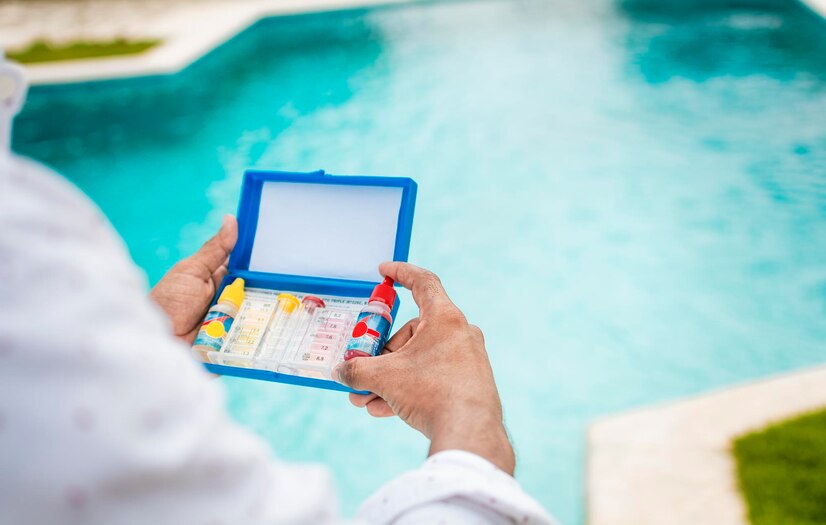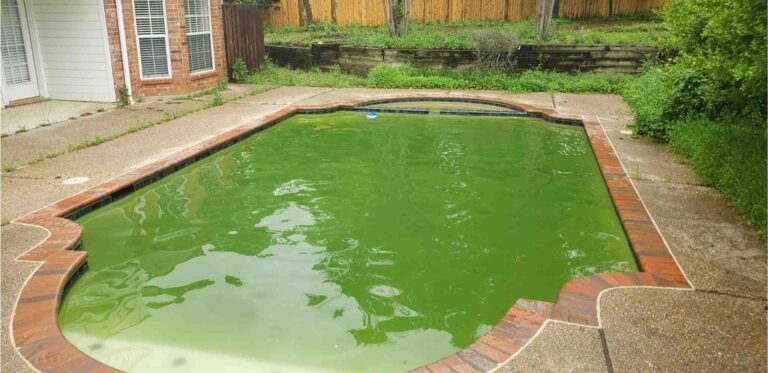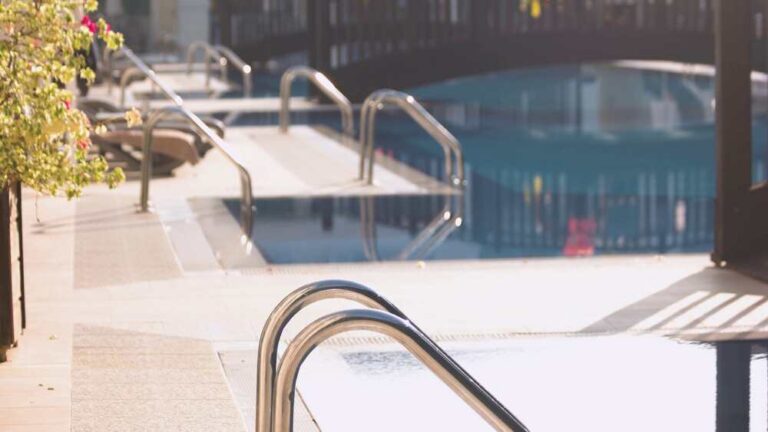Introduction to Swimming Pool Chlorination
What is Chlorine and Why is it Used in Pools?
Chlorine is a widely used pool disinfectant that helps keep water safe and hygienic. It effectively eliminates bacteria, viruses and other contaminants that could pose health risks to swimmers. Dubai’s climate, with its high temperatures, creates an environment where bacteria and algae can thrive, making chlorine essential for pool maintenance.
The Role of Chlorine in Maintaining Pool Hygiene
Maintaining a chlorinated swimming pool ensures that harmful pathogens are neutralized, reducing the risk of waterborne diseases. Without proper chlorine levels, pools can become a breeding ground for bacteria like E. coli and Giardia, leading to serious health concerns.
Importance of Pool Water Sanitation in Dubai’s Climate
Due to the extreme heat in Dubai, evaporation and increased pool usage can lead to rapid changes in water quality. Proper chlorination prevents algae growth, keeps water crystal clear, and ensures a refreshing swimming experience even during the peak summer months.
The Chemistry Behind Chlorine’s Effectiveness
Chlorine works by forming hypochlorous acid (HOCl) when dissolved in water. This acid is highly effective at killing bacteria and breaking down organic materials, keeping pool water clean and safe for swimmers.

The Science of How Chlorine Works in Pools
How Does Chlorine Kill Bacteria and Algae?
Chlorine is an oxidizing agent that disrupts the cell structure of bacteria, viruses, and algae, rendering them harmless. This process is crucial for maintaining safe swimming conditions, especially in public and private pools in Dubai.
Formation of Hypochlorous Acid and Its Disinfecting Properties
When chlorine is added to pool water, it reacts with water molecules to form hypochlorous acid, which is responsible for disinfection. This acid penetrates the cell walls of microorganisms, destroying their ability to reproduce and survive.
Breaking Down Harmful Contaminants in Water
Besides killing bacteria and algae, chlorine also breaks down organic waste such as sweat, oils, and sunscreen residues. Without chlorine, these contaminants would accumulate, making the pool water murky and unsafe for swimming.
Role of Free Chlorine vs. Combined Chlorine
In a properly maintained pool, free chlorine is available to combat new contaminants, whereas combined chlorine (chloramines) forms when chlorine reacts with organic matter. High levels of chloramines can cause strong chlorine odors and irritation, making regular monitoring crucial.
Chlorine’s Interaction with Organic Matter
How Chlorine Reacts with Body Oils, Sweat, and Sunscreens
Swimming pools accumulate organic contaminants such as body oils, sweat, and sunscreen. When chlorine interacts with these substances, it forms byproducts like chloramines, which can cause eye and skin irritation.
The Formation of Chloramines and Their Effects
Chloramines are formed when chlorine binds with nitrogen-based compounds, reducing the effectiveness of chlorine as a disinfectant. High levels of chloramines can lead to red eyes, strong chemical odors, and respiratory discomfort in swimmers.
How to Reduce Chlorine Smell in Pools
To minimize chlorine odors, shocking the pool (superchlorination) is necessary to break down excess chloramines. Regular pool maintenance by professionals like Hello Landscaping and Pool LLC ensures optimal chlorine levels and fresh-smelling water.
Benefits of Using Chlorine in Swimming Pools
Ensuring Safe and Hygienic Swimming Conditions
Chlorine plays a crucial role in pool sanitation, ensuring that swimming pools remain free from bacteria, viruses, and harmful pathogens. Without proper chlorination, pools can become unsafe for swimmers, leading to potential health risks.
How Chlorine Prevents Water Contamination
Chlorine works as a powerful disinfectant, breaking down contaminants introduced by swimmers, such as sweat, body oils, and cosmetics. This ensures that pool water remains hygienic and safe for frequent use.
Maintaining a Balanced Pool Environment
In Dubai’s hot climate, pools are used frequently, increasing the chances of contamination. Regular chlorine treatment helps to maintain water balance, preventing the spread of unwanted microorganisms.
Preventing the Growth of Algae and Harmful Bacteria
Algae thrive in warm, untreated water, leading to green, cloudy pools. Chlorine effectively stops algae growth by oxidizing organic matter and preventing spores from multiplying.
How Algae Forms in Swimming Pools
Algae spores are introduced into pools through wind, rain, and swimmers. If not controlled, they multiply quickly, creating a slimy and unhygienic swimming environment.
The Role of Chlorine in Algae Prevention
When chlorine levels are maintained properly, it destroys algae spores before they bloom, ensuring crystal-clear water.
Protecting Swimmers from Waterborne Illnesses
Unchlorinated pools can become breeding grounds for harmful bacteria like E. coli, Giardia, and Cryptosporidium. These pathogens can cause skin infections, eye irritation, and gastrointestinal issues.
Common Pool-Related Illnesses
- Recreational Water Illnesses (RWIs) – Caused by bacteria and viruses in untreated pools.
- Eye and Skin Irritation – A result of high chloramine levels due to improper chlorine balance.
- Gastrointestinal Infections – Ingesting contaminated pool water can lead to stomach illnesses.
How Chlorine Eliminates Health Risks
Proper chlorine levels neutralize harmful bacteria and viruses, making swimming a safer and healthier experience.

Maintaining Water Clarity and Quality
Maintaining water clarity and quality is essential for a safe and enjoyable swimming experience. Chlorine helps remove bacteria, algae, and organic contaminants, keeping the water clean and clear. Regular testing and proper pool maintenance ensure balanced chlorine levels, preventing cloudy water and potential health risks. In Dubai’s hot climate, effective chlorination is key to maintaining hygienic and sparkling pool water.
Why Cloudy Water Occurs
Cloudy water in a swimming pool happens due to imbalanced chemicals, poor filtration, or organic contaminants like sweat and sunscreen. High pH levels, low chlorine, or clogged filters can make the water look murky. Regular testing, proper chlorine levels, and good filtration help keep pool water clear and safe for swimming.
How Regular Chlorination Improves Water Quality
Regular chlorination is essential for maintaining clean and safe swimming pool water. It helps eliminate harmful bacteria, viruses, and algae, preventing waterborne illnesses. By keeping chlorine levels balanced, pool owners ensure crystal-clear water and a hygienic swimming environment. Proper pool maintenance also extends the life of pool equipment and surfaces.
Why Chlorine is the Best Pool Sanitizer Compared to Other Methods
Chlorine is the most effective pool sanitizer because it kills bacteria, viruses, and algae quickly, ensuring safe and hygienic swimming water. Unlike UV or ozone treatments, chlorine provides continuous disinfection, preventing harmful contaminants from multiplying. It is also affordable, easy to use, and widely available, making it the best choice for Dubai pool owners to maintain clean and healthy water.
Chlorine vs. Bromine
Chlorine and bromine are both powerful pool sanitizers, but they work in different ways. Chlorine acts quickly to kill bacteria and algae, making it ideal for outdoor pools. Bromine, on the other hand, is more stable in warm water and works well in indoor pools and spas. While chlorine is more affordable and widely used, bromine is gentler on the skin and eyes. The right choice depends on your pool type, usage, and maintenance routine.
Chlorine vs. UV and Ozone Systems
Chlorine, UV, and ozone systems are popular methods for keeping pool water clean, but each works differently. Chlorine is the most widely used because it provides continuous disinfection and prevents bacteria and algae growth. UV and ozone systems reduce chlorine usage by breaking down contaminants with light or gas, but they don’t offer residual protection. For Dubai’s hot climate, a combination of chlorine with UV or ozone can improve water quality and swimmer safety while reducing chemical exposure.
Chlorine vs. Saltwater Systems
Chlorine vs. Saltwater Systems – Choosing the right pool sanitation method is essential for water quality and swimmer safety. Chlorine pools effectively kill bacteria and algae but require regular chemical balancing. Saltwater systems use a salt cell to generate chlorine naturally, making them gentler on the skin and eyes. Each system has its benefits, so consider maintenance, cost, and swimmer comfort when deciding.

The Different Forms of Chlorine Used in Swimming Pools
Liquid Chlorine
Liquid chlorine is a powerful and fast-acting pool sanitizer that helps keep swimming pools free from bacteria, algae, and harmful contaminants. It dissolves quickly in water, making it an effective choice for maintaining proper chlorine levels in Dubai’s hot climate. Regular use ensures safe and hygienic swimming conditions, preventing waterborne illnesses and keeping the pool crystal clear.
Pros of Liquid Chlorine
- Fast-acting and ideal for shock treatments.
- Easy to add directly into pool water.
- Affordable for large pools.
Cons of Liquid Chlorine
- Shorter shelf life compared to other forms.
- Can increase pool water’s pH level, requiring additional balancing.
Chlorine Tablets
Chlorine tablets are a convenient and effective way to keep swimming pool water clean and safe. They slowly release chlorine, killing bacteria, algae, and harmful contaminants to maintain proper pool sanitation. Using the right dosage ensures balanced chlorine levels, preventing skin irritation and strong chemical odors. For the best results, follow expert recommendations and store tablets safely.
Pros of Chlorine Tablets
- Convenient and easy to use.
- Long shelf life and consistent chlorine release.
- Helps maintain stabilized chlorine levels.
Cons of Chlorine Tablets
- May lower pool water’s pH levels.
- Can create chemical build-up if not monitored.
Chlorine Granules
Chlorine granules are a fast-dissolving and effective way to keep swimming pool water clean and safe. They help kill bacteria, algae, and other contaminants, ensuring a hygienic swimming experience. Unlike liquid chlorine, granules are easy to store and apply, making them a convenient choice for Dubai pool owners. Regular use of chlorine granules maintains proper chlorine levels, preventing waterborne illnesses and keeping pool water crystal clear.
Best Uses for Granular Chlorine
- Rapidly eliminates contaminants and algae.
- Ideal for weekly shock treatments.
Comparing Effectiveness: Which Type of Chlorine is Best for Your Pool?
Choosing the right type of chlorine for your swimming pool depends on factors like pool size, water exposure to sunlight, and maintenance routine. Liquid chlorine works fast but requires frequent use, while chlorine tablets dissolve slowly, providing consistent sanitation. Granular chlorine is ideal for quick adjustments, and saltwater chlorination offers a low-maintenance option. Consulting a professional pool maintenance service in Dubai, like Hello Landscaping and Pool LLC, ensures you select the best chlorine type for safe and crystal-clear water.
For a Free Consultation, Contact us Today
Proper Chlorine Maintenance and Testing
How to Test Swimming Pool Chlorine Levels

Maintaining proper chlorine levels is essential to keep your pool water clean and safe. Pool owners in Dubai should use reliable testing methods to ensure the water remains free of bacteria and contaminants.
Methods for Testing Chlorine Levels
- Test Strips: A quick and easy method for measuring free and total chlorine levels.
- Liquid Test Kits: Provide more accurate readings by using reagents that change color when mixed with pool water.
- Digital Pool Testers: Advanced devices that offer precise chlorine measurements with digital readouts.
Recommended Chlorine Levels for Dubai’s Hot Climate
Due to Dubai’s intense sunlight and high temperatures, maintaining the right chlorine levels is crucial to prevent bacteria and algae growth. The ideal chlorine levels should be:
- Free chlorine: 1.0 – 3.0 ppm (parts per million)
- Combined chlorine: Less than 0.5 ppm
- Total chlorine: Should always be higher than free chlorine but within the acceptable range
Frequency of Testing and Adjusting Chlorine Levels
To keep your pool sanitary and balanced, regular testing is essential. Pool experts in Dubai recommend the following schedule:
- Daily Testing: For high-traffic or commercial pools.
- Twice a Week: For home pools with moderate use.
- After Rain or Heavy Use: Additional testing is recommended when the pool is heavily used or after a dust storm.
How Temperature Affects Chlorine Levels
Dubai’s hot climate speeds up the breakdown of chlorine, making it essential to adjust chlorine levels accordingly.
Impact of High Temperatures on Chlorine
- Chlorine evaporates faster under direct sunlight.
- Higher temperatures increase bacteria and algae growth, requiring more chlorine.
- Using stabilizers like cyanuric acid helps maintain chlorine levels in strong sunlight.

A Beginner’s Guide to Adding Chlorine to a Pool
How Much Chlorine to Add to a Pool
Determining the correct chlorine dosage is crucial for maintaining a healthy swimming environment. The ideal amount depends on factors such as pool size, water temperature, and usage.
General Chlorine Dosage Guidelines
- Daily Maintenance: Add 1–3 ppm of chlorine.
- Shock Treatment: Use 5–10 ppm to remove contaminants and clear cloudy water.
- After Heavy Usage: Increase chlorine levels to compensate for added contaminants.
Factors Affecting Chlorine Dosage
Pool Size and Volume
The larger the pool, the more chlorine is required. Use this formula to calculate your chlorine needs:
Gallons of Water × Desired PPM ÷ Chlorine Product Concentration
Water Temperature and Sun Exposure
Higher temperatures and direct sunlight reduce chlorine effectiveness, requiring more frequent adjustments.
Number of Swimmers Using the Pool
More swimmers introduce organic matter, sweat, and sunscreen, increasing the chlorine demand. Test and adjust accordingly.
Best Practices for Adding Chlorine Safely
When adding chlorine to your pool, follow these best practices to ensure safety and effectiveness:
Use Protective Gear
- Wear gloves and safety goggles when handling chlorine.
- Avoid direct skin contact with concentrated chlorine products.
Distribute Chlorine Evenly
Pour liquid chlorine around the pool’s edges or use a floating dispenser for tablets and granules.
Allow Circulation Before Swimming
Let chlorine circulate for at least 30–60 minutes before swimming to ensure even distribution.
The Importance of Shock Treatment for Pool Maintenance
What is Pool Shocking?
Pool shocking is a deep cleaning method used to eliminate bacteria, algae, and organic contaminants. This process involves adding a higher-than-usual dose of chlorine or non-chlorine shock treatments to the water, breaking down harmful substances and restoring clarity.
When and How Often to Shock a Pool
Pool owners in Dubai should shock their pools:
- Weekly: To maintain clean and safe water.
- After Heavy Usage: If the pool is used by many swimmers.
- Following Rainstorms: To remove contaminants and restore pH balance.
- When Water Becomes Cloudy: A sign of bacterial buildup or chlorine imbalance.
Types of Pool Shock Treatments
- Calcium Hypochlorite: A powerful chlorine-based shock ideal for killing bacteria.
- Sodium Dichlor: A stabilized shock that dissolves quickly and is suitable for regular maintenance.
- Non-Chlorine Shock: Ideal for sensitive swimmers, this shock oxidizes contaminants without chlorine.
How to Shock a Pool Safely in Dubai’s High Temperatures
Dubai’s intense heat accelerates chlorine breakdown, so it’s important to follow safe practices:
- Shock at Night: To prevent rapid chlorine evaporation.
- Use the Right Amount: Follow manufacturer guidelines to avoid over-chlorination.
- Keep the Pool Circulating: Run the filtration system for at least 8 hours.
- Wait Before Swimming: Allow at least 12–24 hours for chlorine levels to normalize.
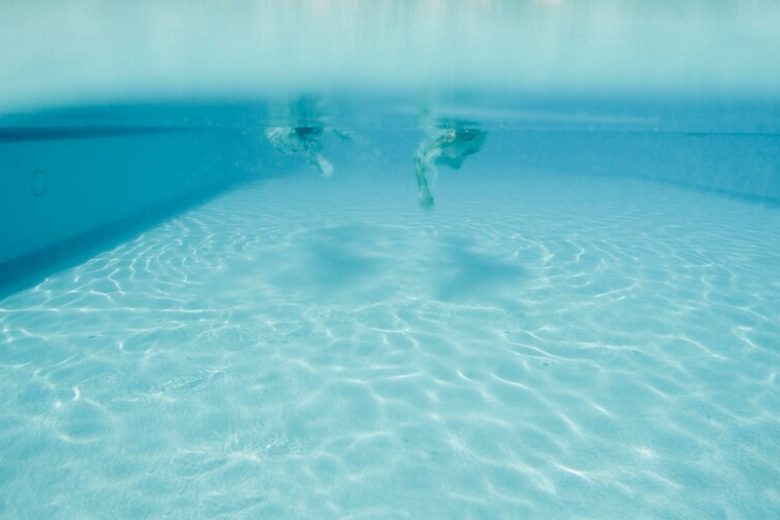
Potential Risks and Precautions of Using Chlorine in Pools
Skin and Eye Irritation – Causes and Prevention
Prolonged exposure to high chlorine levels can cause red eyes, dry skin, and irritation. Prevent this by maintaining balanced chlorine levels and rinsing off after swimming.
Chlorine’s Effect on Hair and Swimwear
- Hair Damage: Chlorine strips natural oils, leading to dryness and discoloration.
- Swimwear Fading: Frequent exposure causes fabric breakdown.
- Prevention: Rinse hair and swimwear after swimming, and use a swim cap.
Health Risks of High Chlorine Exposure
Excessive chlorine exposure can lead to:
- Respiratory Issues: Strong chlorine fumes may irritate the lungs.
- Skin Allergies: Some swimmers experience rashes from prolonged exposure.
- Gastrointestinal Problems: Ingesting chlorinated water can cause stomach discomfort.
How to Reduce Chlorine’s Adverse Effects on Swimmers
To minimize the negative effects of chlorine:
- Use a Pool Cover: Reduces chlorine evaporation and maintains chemical balance.
- Install a Pool Ventilation System: Helps disperse strong chlorine fumes.
- Maintain Proper pH Levels: Keeps chlorine at optimal effectiveness.
- Consider Alternative Sanitizers: Such as UV or ozone systems.

Alternative Disinfection Methods for Swimming Pools
Saltwater Pools vs. Chlorinated Pools
Saltwater pools use a salt chlorine generator to produce natural chlorine, offering a gentler alternative to traditional chlorine pools.
- Pros: Softer on skin, lower maintenance.
- Cons: Higher initial cost, requires regular cell cleaning.
UV Pool Sanitization Systems
UV systems use ultraviolet light to destroy bacteria and algae without adding chemicals.
- Pros: Chemical-free, eco-friendly, reduces chlorine dependency.
- Cons: Requires additional filtration, higher upfront cost.
Ozone Pool Treatment – Pros and Cons
Ozone gas eliminates contaminants more effectively than chlorine alone.
- Pros: Reduces chlorine use, eliminates strong chlorine odors.
- Cons: Needs constant ozone generation, higher maintenance.
Can You Maintain a Pool Without Chlorine?
While alternatives exist, completely chlorine-free pools are rare. Most pools use a combination of methods, such as UV, ozone, and minimal chlorine, for optimal sanitation.
For expert pool cleaning and maintenance in Dubai, contact Hello Landscaping and Pool LLC at +971 50 866 5595 or email us at info@hellolandscapingllc.com.

Understanding Pool Water Chemistry Beyond Chlorine
The Role of pH in Pool Water Balance
The pH level of a pool determines how effective chlorine is at sanitizing the water. The ideal pH range for pools is between 7.2 and 7.6. If the pH is too low, the water becomes acidic, leading to corrosion of pool equipment. If too high, chlorine becomes less effective, allowing bacteria and algae to grow.
Alkalinity and Its Impact on Water Quality
Total Alkalinity (TA) acts as a buffer, preventing pH fluctuations in pool water. A TA level between 80-120 ppm stabilizes pH and prevents sudden changes that can cause irritation to swimmers and damage pool surfaces.
Calcium Hardness – Why It Matters
Calcium hardness measures the amount of dissolved calcium in pool water. The ideal range is 200-400 ppm. If too low, water becomes corrosive, damaging tiles and pipes. If too high, calcium scaling can occur, leading to cloudy water and buildup on pool surfaces.
How to Balance Pool Chemicals for Optimal Performance
- pH Adjustment: Use sodium bicarbonate to raise pH and muriatic acid to lower it.
- Alkalinity Control: Add baking soda to increase alkalinity and acid to decrease it.
- Calcium Hardness Regulation: Use calcium chloride if levels are too low.
- Chlorine Stabilization: Add cyanuric acid (CYA) to protect chlorine from UV breakdown.
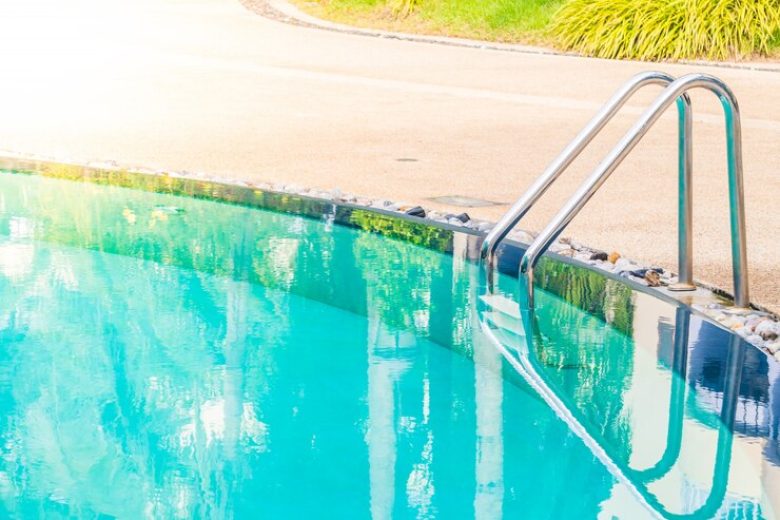
The Environmental Impact of Chlorine in Swimming Pools
How Chlorine Affects the Surrounding Environment
Chlorine runoff from pools can seep into groundwater and negatively impact plants, soil, and local water systems. In high concentrations, it can be toxic to aquatic life in nearby lakes, rivers, and oceans.
Ways to Minimize Chlorine’s Environmental Impact
- Limit Chlorine Overuse: Maintain proper levels to avoid excess discharge.
- Use Pool Covers: Reduces chlorine evaporation and the need for frequent chemical additions.
- Dispose of Pool Water Responsibly: Avoid draining chlorinated water directly into storm drains.
Using Eco-Friendly Pool Maintenance Practices
Pool owners in Dubai can adopt sustainable cleaning methods, such as:
- UV or Ozone Systems: Reduce chlorine dependency while maintaining clean water.
- Natural Enzyme Treatments: Break down organic contaminants without harsh chemicals.
- Energy-Efficient Pool Pumps: Reduce water wastage and chemical consumption.

Professional Pool Maintenance Services in Dubai
Why Choose Professional Pool Cleaning Services?
Hiring professional pool cleaning services ensures:
- Regular chlorine level testing and chemical balancing.
- Thorough cleaning of filters, tiles, and pool surfaces.
- Timely maintenance to prevent algae growth and equipment damage.
Benefits of Hiring Hello Landscaping and Pool LLC
As Dubai’s leading pool maintenance company, we offer:
- Experienced professionals for safe and efficient pool care.
- Use of high-quality chlorine and eco-friendly sanitizers.
- Customized maintenance packages for residential and commercial pools.
How Our Experts Ensure Safe and Clean Pool Water
At Hello Landscaping and Pool LLC, our experts follow a strict maintenance routine that includes:
- Regular testing of chlorine, pH, and alkalinity levels.
- Deep cleaning of pool walls, floors, and filters.
- Prompt treatment of algae and bacterial growth.
Our Pool Maintenance Packages in Dubai
We offer customized pool maintenance plans based on:
- Weekly or monthly cleaning and chemical balancing.
- Emergency pool repairs and shock treatments.
- Eco-friendly chlorine alternatives and water-saving techniques.
Contact us at +971 50 866 5595 or info@hellolandscapingllc.com to book your service.


